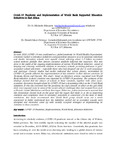Covid-19 Pandemic and Implementation of World Bank Supported Education Initiatives in East Africa
Abstract
In early 2020, COVID-19 was confirmed as a global pandemic by World Health Organization. Countries rushed to introduce lockdown and quarantine measures so as to minimise infections and deaths. Secondary schools were equally closed; affecting about 1.5 billion secondary school students globally. East African countries similarly followed this trajectory. This was done in the midst of the ongoing implementation of various World Bank initiatives- aimed at keeping and retaining vulnerable students in secondary schools; providing pathways to girls’ secondary school education – especially those who had dropped out due to early pregnancy and marriage. Cursory studies had earlier indicated that school closure, necessitated by COVID-19, greatly affected the implementation of this initiative in East African countries of Tanzania, Kenya and Uganda. This study- based on literature review, examined how World Bank initiatives in these countries was impacted by COVID-19 pandemic. The synthesis of the findings showed that the closure of schools in these countries, together with other socio-economic disruption brought about by COVID-19 had a devastating effect on the World Bank initiatives. It was also reviewed that the pandemic has had a knock-on effect on the girl child; Girls were exposed more to some of the social cultural challenges they had escaped from such as Female Genital Mutilation and Early Marriages. Either too, policy makers were worried that this devastation clawed back on the gains that the region had made in as far as improving retention and completion rates in secondary education is concerned. On the basis of these revelations, this study recommends that World Bank group should carry out a needs assessment to better understand how the initiatives carried out in secondary schools were disrupted and thereafter come up with socially accepted strategies of implementing its initiative in these countries.

